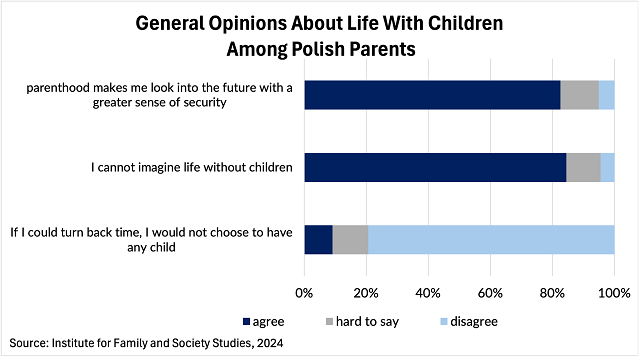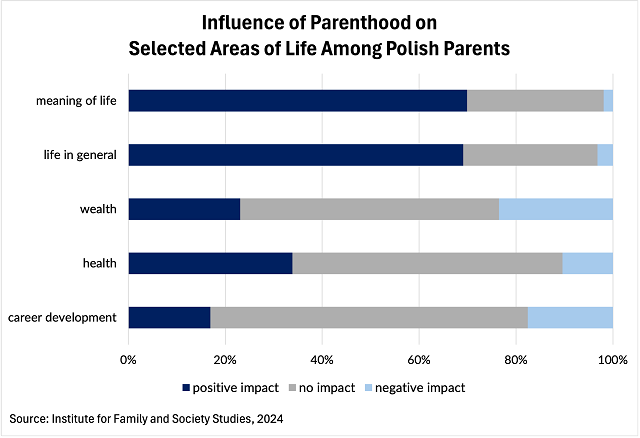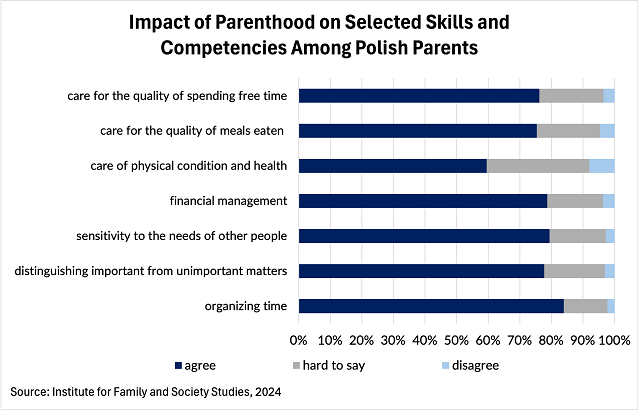Highlights
- Nearly three-fourths of Polish parents say the intangible benefits of being a parent outweigh the financial costs, and 85% cannot imagine life without a child. Post This
- Most Polish parents are satisfied with the number of children they have. Post This
- The vast majority of Polish parents thrive from having children, with parenthood promoting the development of skill and competency in various areas. Post This
Parenting is a multi-dimensional experience that positively affects men and women’s skills, competence, and attitudes in ways that are useful in their work outside the home, according to a report from the Polish think-tank, the Institute for Family and Society Studies. The 2024 report is based on a nationwide representative survey of parents in Poland.
Parenthood Is Rewarding, Despite the Costs
The majority of Polish parents claim that it's worth being a parent. Nearly three-fourths of parents in our study (72%) claim that the intangible benefits of being a parent outweigh the financial costs of raising children. Only 6% disagree. Furthermore, 85% of parents cannot imagine life without a child (10% have no opinion), and almost 80% say they would have children if they could decide again.
Parenthood also increases a sense of security for the future: there were over 70% of positive responses to the statement: "parenthood makes me look into the future with a greater sense of security." We also found that the sense of security in old age increases as the age of parents and the number of children increase.

Polish parents say that children make life better—especially in terms of the sense of meaning in life (70%) and life in general (69%). Only 3% claim a negative influence.
Parenthood and Career Are Not in Conflict
Our survey also asked parents about the influence their children have had on their careers. We found that 82% state that parenthood does not have a negative impact on career development. Interestingly, the percentage of such opinions grows with age—from 38% of parents ages 18-24, through 54% for the group ages 25-24, and over 60% for ages 35-44 and 45-54 years, and up to 70% for those ages 55 and over.

The Benefits of Parenthood
The results suggest that the vast majority of Polish parents thrive from having children. According to the majority of respondents, parenting promotes the development of competences and skills in organizing time, distinguishing important from unimportant matters (81%), as well as a greater sensitivity to the needs of other people (79%), and better financial management (79%). Nearly 60% claim that parenthood also fosters greater care of physical condition and health, for the quality of meals eaten (75%), and for the quality of spending free time (76%).

Worry is Part of Parenting
Of course, parenting children is hard and brings with it stress and worry over children’s well-being. Most often parents in the study reported concerns about their child's health (42.2%). Next, over 1/5 of parents expressed fears of excess responsibilities (25.1%), finances (25.0%), inability to care for their children (24.8%), and the inability to reconcile work and parenthood (20.3%). But the good news is that most of these fears about parenting are not confirmed in real life. For example, fears about the child's health (mentioned most often as a worry) were only confirmed by one-third of the respondents.
Parenting Large Families
In the case of large families, respondents indicated many advantages but also difficulties. Among the advantages of having three or more children, parents most often pointed out the opportunity to: spend time together with siblings, develop independence among children, or form mutual support for siblings. Most frequently mentioned difficulties were: higher expenses and less space in the apartment/housing. As people age, parents increasingly reported greater chances of providing care in old age as a benefit of having a large family. The more children the surveyed parents have, the more often they noticed these benefits.
Most Polish parents are satisfied with the number of children they have—if they were to decide on the number of children again, two-thirds would choose the same. The percentage of people who recommend having large families increased with the number of children and the number of siblings.
Overall, we found that Polish people with more children, those who are religious, and those from older age groups were noticeably more likely to express positive opinions about their own experiences of being a mother or father.
Dorota Gizicka, Ph.D. is a research associate at the Department of Social Theory and Sociology of Family at the John Paul II Catholic University of Lublin, and President of the ISL Foundation which supports social, scientific and educational activities for the development of civil society. Michał A. Michalski, Ph.D. is professor at Adam Mickiewicz University, Poznań, and President of the Institute for Family and Society Studies Foundation. Krzysztof Szwarc, Ph.D. is an employee of the Department of Education and Personnel Development at the Poznań University of Economics and Business, specializing in demographic studies, particularly fertility differentiation.












